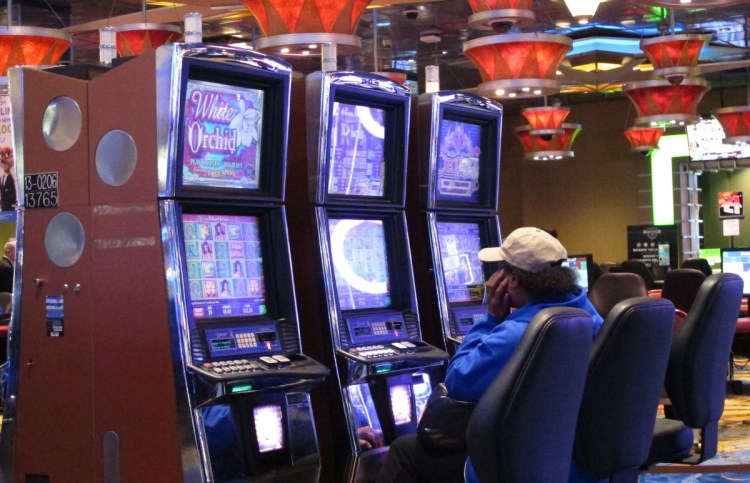WASHINGTON — Oklahoma’s 128 tribal casinos host 46 million visits and rake in $4.5 billion a year – but there isn’t a single billboard in the state that tells problem gamblers where they can find help.
“We can’t afford it. It costs $1,200 to $1,400 a month for a billboard,” said Wiley D. Harwell, executive director of the Oklahoma Association for Problem and Compulsive Gambling.
With $186,000 from the state and about $100,000 from Indian tribes and other donations annually, Harwell’s group operates a hotline, trains counselors and gives public education talks. Billboards won’t fit into the budget – which might explain why the hotline received just 1,020 calls in 2016, even though an estimated 65,000 Oklahoma adults have a gambling problem.
Overall, the Sooner State dedicates $1 million a year – 25 cents per capita – to help problem gamblers. The national average, among the 40 states that spend anything at all, is 37 cents per capita.
By clearing the path for all states to permit sports betting, the U.S. Supreme Court this week set the stage for “the largest potential expansion of gambling in our nation’s history,” said Marlene Warner, executive director of the Massachusetts Council on Compulsive Gambling and current board president of the nonprofit National Council on Problem Gambling. She predicted that problem gambling will increase, too, “unless steps are taken to minimize harm.”
Warner would like to see any state that permits sports betting dedicate a percentage of revenues to prevention and treatment. In many states, that is unlikely to happen.
The federal government mostly leaves gambling regulation, and gambling addiction programs, up to the states. Only 17 states pay for one or more full-time staff positions to help problem gamblers, according to a 2016 survey of problem gambling services by the National Council on Problem Gambling and the Association of Problem Gambling Service Administrators. Others operate on a shoestring with half-time positions and volunteers.
Seven states with at least some legal gambling – Alabama, Arkansas, Idaho, Kentucky, Montana, New Hampshire and Texas – spend no state money at all to combat problem gambling. Arkansas, for example, stopped spending state money on problem gambling in 2015, redirecting the $200,000 – which came from the state lottery – to scholarships.
Alaska, Hawaii and Utah are the other three states that don’t spend state money on problem gambling services, but those states have limited gambling opportunities within their borders.
Gambling disorder, as the addiction is classified medically, is believed to affect about 2.2 percent of U.S. adults. Unlike those who abuse alcohol or drugs, problem gamblers may not show signs of their addiction until financial ruin is upon them, experts say.
Brad Martin, 44, a former school superintendent in Springfield, Ohio, illustrates the problem.
“I didn’t know I had an issue until I got caught,” he said.
Martin admitted in 2015 to skipping more than 300 hours of work to gamble at casinos, enabling his truancy by falsifying mileage reports, sick leave requests and other documents over a two-year period. He was sentenced to six months in jail, five years of probation and 500 hours of community service. He repaid the school district more than $46,000.
Fortunately for Martin, Ohio is one of 13 states that offer free or low-cost inpatient residential treatment for problem gamblers. Ohio voters approved a constitutional amendment in 2009 authorizing casinos in Cincinnati, Cleveland, Columbus and Toledo and requiring a 2 percent tax on casinos’ gross revenue to be dedicated to a problem gambling fund.
Martin was able to leave jail twice a week for counseling sessions. He now has a job he likes managing a warehouse, where he supervises about 130 people.
“No one is ever turned away” from counseling for problem gambling in Ohio, said Stacey Frohnapfel-Hasson, Ohio’s bureau chief for gambling services.
The state screened more than 68,000 Ohio residents for gambling disorder in 2017, a 35 percent increase from the year before, and increased the number being diagnosed or treated for gambling disorder by 11 percent to 1,159, Frohnapfel-Hasson said.
Massachusetts increased funding for problem gambling by enacting a gaming law that includes addiction services. The law not only allows construction of up to three destination resort casinos but also calls for addiction services and public health research into problem gambling.
Send questions/comments to the editors.



Success. Please wait for the page to reload. If the page does not reload within 5 seconds, please refresh the page.
Enter your email and password to access comments.
Hi, to comment on stories you must . This profile is in addition to your subscription and website login.
Already have a commenting profile? .
Invalid username/password.
Please check your email to confirm and complete your registration.
Only subscribers are eligible to post comments. Please subscribe or login first for digital access. Here’s why.
Use the form below to reset your password. When you've submitted your account email, we will send an email with a reset code.